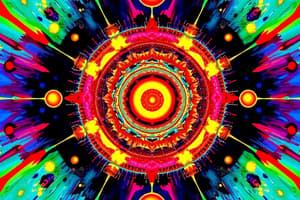Podcast
Questions and Answers
What characteristic distinguishes interstitial compounds from typical ionic or covalent compounds?
What characteristic distinguishes interstitial compounds from typical ionic or covalent compounds?
- They are usually non-stoichiometric. (correct)
- They have a fixed oxidation state.
- They exhibit properties of gases.
- They possess strong ionic bonds.
Which of the following statements is true regarding the melting points of interstitial compounds?
Which of the following statements is true regarding the melting points of interstitial compounds?
- They do not have a definite melting point.
- They have melting points comparable to gases.
- They have lower melting points than pure metals.
- They have higher melting points than pure metals. (correct)
What is a defining feature of alloys formed from transition metals?
What is a defining feature of alloys formed from transition metals?
- They have large atomic radii differences.
- They are always non-metallic.
- They cannot retain metallic conductivity.
- They are usually homogeneous solid solutions. (correct)
Which types of metals are often blended to create brass?
Which types of metals are often blended to create brass?
What occurs during the disproportionation of an oxidation state?
What occurs during the disproportionation of an oxidation state?
Which of the following properties is NOT characteristic of interstitial compounds?
Which of the following properties is NOT characteristic of interstitial compounds?
What is one reason transition metals readily form alloys?
What is one reason transition metals readily form alloys?
Which of the following is an example of a ferrous alloy?
Which of the following is an example of a ferrous alloy?
Which element exhibits all oxidation states from +2 to +7?
Which element exhibits all oxidation states from +2 to +7?
What is the primary reason for the lesser number of oxidation states at the extreme ends of the transition metals?
What is the primary reason for the lesser number of oxidation states at the extreme ends of the transition metals?
Which oxidation state is virtually unknown for Scandium?
Which oxidation state is virtually unknown for Scandium?
What is the maximum oxidation state of Iron that is typically stable?
What is the maximum oxidation state of Iron that is typically stable?
What oxidation state of Zinc is commonly found?
What oxidation state of Zinc is commonly found?
Which transition metal is noted for having a stable +4 oxidation state?
Which transition metal is noted for having a stable +4 oxidation state?
What is one key characteristic of transition elements related to their oxidation states?
What is one key characteristic of transition elements related to their oxidation states?
Which of the following oxidation states is common for Copper?
Which of the following oxidation states is common for Copper?
Which ions are identified as the strongest oxidising agents in aqueous solutions?
Which ions are identified as the strongest oxidising agents in aqueous solutions?
What are the strongest reducing agents among the given transition metals?
What are the strongest reducing agents among the given transition metals?
What phenomenon explains the non-regularities in the Eo values for transition metals?
What phenomenon explains the non-regularities in the Eo values for transition metals?
Why is the Mn3+/Mn2+ couple's Eo value more positive compared to Cr or Fe?
Why is the Mn3+/Mn2+ couple's Eo value more positive compared to Cr or Fe?
Which transition metal ion exhibits the highest oxidation state in its oxide or fluoride form?
Which transition metal ion exhibits the highest oxidation state in its oxide or fluoride form?
What distinguishes diamagnetic substances from paramagnetic substances?
What distinguishes diamagnetic substances from paramagnetic substances?
Which of the following statements is accurate regarding the magnetic behavior of substances?
Which of the following statements is accurate regarding the magnetic behavior of substances?
Which metal is recognized as a stronger reducing agent compared to the others in a dilute acid solution?
Which metal is recognized as a stronger reducing agent compared to the others in a dilute acid solution?
What happens to ionization energies along the 3d series?
What happens to ionization energies along the 3d series?
What is expected to happen to second ionization enthalpy as effective nuclear charge increases?
What is expected to happen to second ionization enthalpy as effective nuclear charge increases?
Which ionization process shows a break in the trend of increasing enthalpy?
Which ionization process shows a break in the trend of increasing enthalpy?
What contributes to the variation in ionization enthalpy for an electron configuration of dn?
What contributes to the variation in ionization enthalpy for an electron configuration of dn?
What does the exchange energy pertain to in the context of ionization enthalpy?
What does the exchange energy pertain to in the context of ionization enthalpy?
According to Hund's rule, how should electrons occupy degenerate orbitals?
According to Hund's rule, how should electrons occupy degenerate orbitals?
Why is the ionization enthalpy of Mn+ lower than that of Cr+?
Why is the ionization enthalpy of Mn+ lower than that of Cr+?
Which configuration explains why Fe2+ has lower ionization enthalpy than Mn2+?
Which configuration explains why Fe2+ has lower ionization enthalpy than Mn2+?
What is the main use of potassium dichromate in volumetric analysis?
What is the main use of potassium dichromate in volumetric analysis?
Which ion is reduced in the acidic solution involving potassium dichromate?
Which ion is reduced in the acidic solution involving potassium dichromate?
What is the oxidation product when iodide is oxidized by acidified potassium dichromate?
What is the oxidation product when iodide is oxidized by acidified potassium dichromate?
In the reaction with potassium dichromate, what is the product formed when tin(II) is oxidized?
In the reaction with potassium dichromate, what is the product formed when tin(II) is oxidized?
What is the outcome of the reaction: 6 I^- → 3 I2 + 6 e?
What is the outcome of the reaction: 6 I^- → 3 I2 + 6 e?
What is the initial compound formed in the production of potassium permanganate?
What is the initial compound formed in the production of potassium permanganate?
Which of the following half-reactions occurs in the presence of potassium dichromate in acidic solution?
Which of the following half-reactions occurs in the presence of potassium dichromate in acidic solution?
What is formed when K2MnO4 disproportionates in solution?
What is formed when K2MnO4 disproportionates in solution?
Study Notes
Ionization Energies and Configurations
- Ionization energies show slight increases along the 3d series due to d-electron shielding differences.
- Doubly or highly charged ions lack 4s electrons and exhibit a trend of increasing second ionization enthalpy as effective nuclear charge rises.
- The trend deviates for Mn2+ and Fe3+ formations, both having a d5 configuration.
Influence of d-Electron Configurations
- Variation in ionization enthalpy depends on three factors: nuclear attraction on each electron, electron-electron repulsion, and exchange energy.
- Exchange energy stabilizes the electronic state and is related to the number of parallel spins in degenerate orbitals (Hund's rule).
- Loss of exchange energy decreases stability, making ionization more difficult, particularly at higher configurations.
Transition Metals and Oxidation States
- Transition metals near the series' middle exhibit the greatest variability in oxidation states, with manganese displaying states from +2 to +7.
- Early in the series, Scandium (II) is rare, while Titanium (IV) is more stable; at the series' end, Zinc predominantly exhibits +2.
- Abrupt decreases in oxidation states appear after manganese due to d and s electron counts.
Redox Properties
- Mn and Co ions are strong oxidizing agents, while Ti, V, and Cr act as strong reducing agents.
- Irregularities in E values for redox couples can be attributed to varying ionization enthalpies and sublimation enthalpies, especially for manganese and vanadium.
Magnetic Properties
- Two main types of magnetic behavior are noted: diamagnetism (repelled by magnetic fields) and paramagnetism (attracted).
- Interstitial compounds, containing elements like Ti, Mn, and Fe, are characterized by high melting points, hardness, and metallic conductivity.
Alloys
- Alloys consist of mixed metals, forming homogeneous solid solutions when atomic radii are within 15% of each other.
- Transition metals form durable alloys used in industries, with ferrous alloys being essential for steel production.
- Common alloys include brass (copper-zinc) and bronze (copper-tin).
Disproportionation
- When an oxidation state becomes less stable compared to higher and lower oxidation states, it undergoes disproportionation.
- Manganese(IV) can be reduced to manganese(III) or oxidized to manganese(VI) in acidic conditions.
Potassium Permanganate
- Prepared by fusing MnO2 with alkali metal hydroxide and an oxidizing agent; can disproportionate to permanganates in solution.
- Common uses include oxidation reactions in organic chemistry due to its strong oxidizing properties and high solubility as compared to sodium dichromate.
Studying That Suits You
Use AI to generate personalized quizzes and flashcards to suit your learning preferences.
Description
This quiz explores the trends in ionization energies within the 3d series elements. It focuses on how the effective nuclear charge influences ionization enthalpy, particularly for doubly and more highly charged ions. Test your understanding of these important concepts in chemistry.



